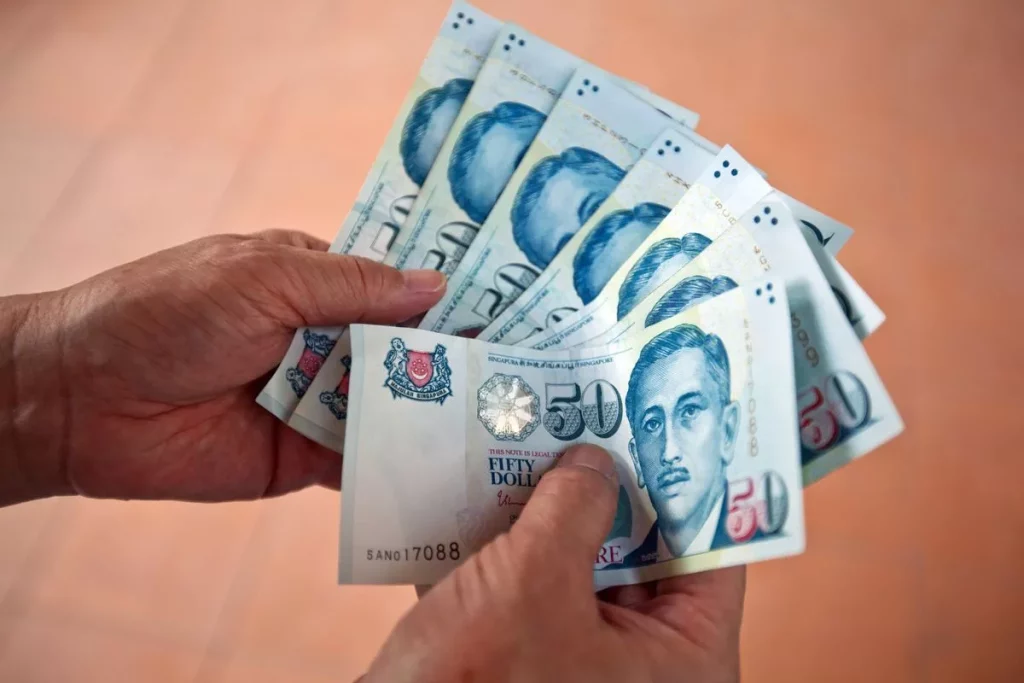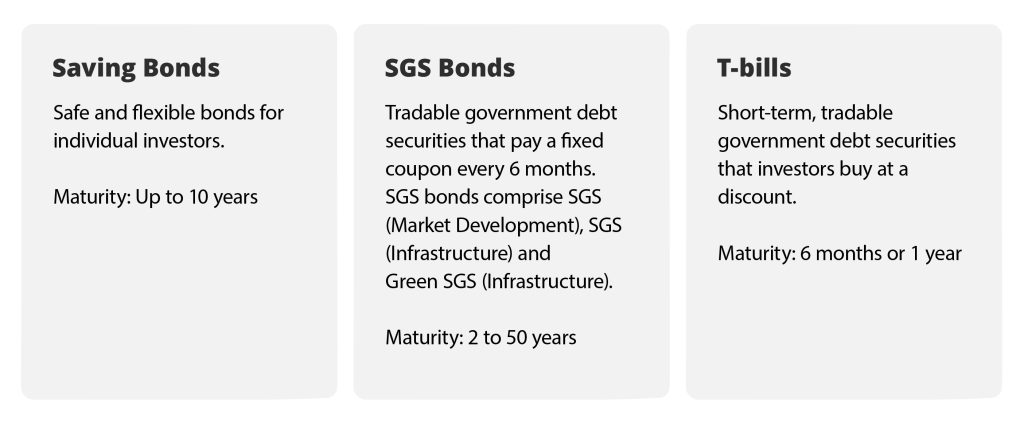Singapore Government bonds offer investors a wide range of investment options. To help you decide which product is most appropriate for your investment profile, we break down the different products offered by the Singapore Government.
SGS Bonds
A Singapore Government Securities Bond is a government-backed bond that is fully backed by the Singapore Government. The bond has the strongest credit rating of AAA from major credit agencies. With maturities ranging from 2 to 50 years, SGS bonds pay a fixed interest rate.
There are three types of SGS bonds – 1) SGS (Market Development), 2) SGS (Infrastructure), and 3) Green SGS (Infrastructure).
There are two key differences between the three types of SGS bonds: the legislation under which the bonds are issued and how the proceeds are used.
The SGS bonds are suitable for investors who wish to invest in a safe asset between 1-2 years, as they provide higher yields than SSBs. The yield for the 2-year SGS bond is around 3.39% as of 4 October 2022. SGS bonds have a fixed maturity date, but investors can still trade them on the secondary market. Through an SGX broker, investors can trade SGS bonds.
SGS bonds are subject to price fluctuations in the secondary market, which is one risk associated with buying them. If sold before maturity, the bond’s value may be lower than its par value, resulting in additional losses. As interest rates rise, bonds’ prices will decline, so we consider SGS bonds to be suitable for investors who can hold short-term SGS bonds until maturity.
| SGS (Market Development) | SGS (Infrastructure) | Green SGS (Infrastructure) | |
| Legislation | Government Securities (Debt Market and Investment) Act 1992 | Significant Infrastructure Government Loan Act 2021 (SINGA) | Significant Infrastructure Government Loan Act 2021 (SINGA) |
| Objective | To develop the domestic debt market | To finance major, long-term infrastructure | To finance major, long-term green infrastructure projects |
| Tenor | 2, 5, 10, 15, 20, 30, or 50 years | ||
| Frequency of issuance | Monthly, for at least 5 years | ||
| Minimum investment amount | SGD 1,000, in multiples of SGD 1,000 | ||
| Maximum investment amount | Up to the allotment limit for auctions | ||
| Buy using SRS and CPF funds? | CPF and SRS | ||
| Interest payment | Every 6 months, starting from the month of issue | ||
| Secondary market trading | Yes | ||
T-bills
Treasury bills are Singapore Government Securities that are issued for a short period of time. There are two short tenors of T-bills: 6 months and 1 year. The T-bill, unlike the SGS bonds, does not pay interest but is issued at a discount to its face value. T-bills will be redeemed at their face value of 100 upon maturity.
SGS T-Bills provide decent yields for a short period of time, so investors can park their money in a safe asset for a short period of time. It is also suitable for investors who are undecided and want to wait out market volatility and uncertainty. On 4 Oct 2022, the cut-off yield for the latest 6-month T-Bill auction was 3.32%, which is a much better alternative to fixed deposits and bank deposits.
| T-Bills | |
| Tenor | 6 months or 1-year |
| Frequency of issuance | Quarterly |
| Minimum investment amount | SGD 1,000, in multiples of SGD 1,000 |
| Maximum investment amount | Up to the allotment limit for auctions |
| Buy using SRS and CPF funds? | SRS and CPF |
| Interest payment | N/A |
| Secondary market trading | Yes |
Singapore Savings Bonds
Singapore Savings Bonds, or SSBs, are special Singapore Government Securities. This bond is issued monthly and has a tenor of up to 10 years. SSB interest rates are determined by the yield to maturity of the corresponding SGS bond. The 5-year average return on the SSB should be the same as the 5-year yield on the SGS bond.

SSBs are unique in that they provide increasing returns over time. For as long as you own the bond, the interest rate will “step up” every year. Due to this, the SSB’s average return increases each year, as the next interest payment is higher than the last.
As long as short-term rates are higher than long-term rates (an inverted yield curve), MAS will adjust SSB coupons so that they never step down. A 10-year SSB will always yield the same yield as a 10-year SGS bond (when held to maturity).
In addition to the flexibility to redeem the bond at any point in time (during the tenor of 10 years), the SSB offers another unique feature. By the second business day of the next month, holders of the SSB can redeem their SSB and receive their principal (including accrued interest).
Investments in SSBs are suitable for investors who wish to enjoy flexibility. SSBs do not have a fixed term, so investors can redeem them whenever they want. Aside from this, secondary market trading does not affect the SSB, which reduces volatility. Furthermore, the absence of secondary market trading also makes it difficult to earn capital appreciation on the bond when interest rates fall.
| Singapore Savings Bonds | |
| Tenor | Up to 10 Years |
| Frequency of issuance | Monthly, for at least 5 years |
| Minimum investment amount | SGD 500, in multiples of SGD 500 |
| Maximum investment amount | SGD 200,000 overall |
| Buy using SRS and CPF funds? | Only SRS |
| Interest payment | Every 6 months, starting from the month of issue |
| Secondary market trading | No |

Verdict
Singapore Government Securities Bonds are long-term government bonds. Retail investors can invest in Singapore Savings Bonds for a variety of periods. The Monetary Authority of Singapore issues T-bills, short-term debt with one-year maturities. For investors, each serves a different purpose and has a different time horizon.
| Singapore Savings Bonds (SSB) | Singapore Government Securities (SGS) Bonds | Treasury Bills (T-Bills) | |
|---|---|---|---|
| What is it? | Safe and flexible bond option for investors | Tradable government debt securities | Short-term tradable government debt securities |
| How does it work? | Pays interest every 6 months | Pays a fixed couple every 6 months | Investors buy it at a discount. Upon maturity, investors will then receive the full face value of the bill |
| Investment duration | 10 years | 2, 5, 10, 15, 20, 30, 50 years | 6 months or 1 year |
| Minimum investment | $500, and in multiples of $500 | $1,000, and in multiples of $1,000 | $1,000, and in multiples of $1,000 |
| Maximum limit per investor | $200,000 | Auction: up to allotment limit for auctions Syndication: None | No Limit; up to the allotment limit for auctions |
| Fees | Cash: $2 | Cash: $2 (Waived if you apply through DBS internet banking) | Cash: $2 (Waived if you apply through DBS internet banking) CPFIS: $2.50 transaction fee, $2 quarterly service fee per counter |
| Type of Interest Payment | Fixed coupon, steps up each year | Fixed coupon | No coupon; issued and traded at a discount to the face (par) value |
| Payment of interest | Every 6 months, starting from the month of issue | Every 6 months, starting from the month of issue | At maturity |
| How is the price and rate determined? | The interest rate is fixed and published by Monetary Authority of Singapore (MAS) every month The interest rate is announced before the application | Determined by auction | Determined by auction |
| How to apply? | Apply through DBS/POSB, OCBC and UOB ATMs or internet banking | Apply through DBS/POSB, OCBC and UOB ATMs or internet banking | Apply through DBS/POSB, OCBC and UOB ATMs or internet banking |
| How to redeem? | Redeem the full principal with accrued interest through Online Bank or ATM There will be no penalty for early withdrawal | No early redemption | No early redemption |
| Can we buy/sell on secondary markets? | No | At DBS, OCBC or UOB main branches; on SGX through brokers | At DBS, OCBC or UOB main branches |
| Transferable? | No | Yes | Yes |
| Can we invest using our SRS account? | Investors can invest through their respective SRS Operator’s internet banking portal | Investors can invest through their respective SRS Operator’s internet banking portal | Investors can invest through their respective SRS Operator’s internet banking portal |
| Can we invest using our CPF/SRS? | CPF: No SRS: Yes | Auction: Yes Syndication: No | Yes |
| Tax | There is no capital gains tax in Singapore | ||
(Credits: Pexels, dbs)
Since you’re here, why not read:



























